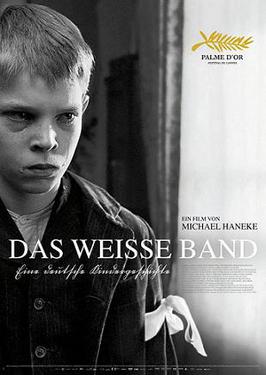
The brilliant and scalding "The White Ribbon" is the second-best film of 2009, after "The Hurt Locker."
The film, from controversial director Michael Haneke, won the top prize at this year's Cannes Film Festival, and I can certainly see why. It proves that Cannes is still an artistic organization of the highest order, perhaps the world's greatest defender of artistic cinema.
"White Ribbon" is a quietly brutal evisceration of traditional German culture set in a fictional village on the eve of World War I. The (fictional) local schoolteacher narrates the film as an old man, probably from the vantage point of 1955 or so, when all Germans and Austrians were trying to figure out how their culture could have produced one of the most evil socio-political movements in human history. (Although few people seem to remember that what the Spaniards, English, and French did to exterminate Native Americans and then enslave Africans was even worse. It just happened a longer time ago.)
The film brings the schoolteacher's memories to life, and we watch the strange goings-on in his village. Some terrible things occur, the details of which I'll leave out. Let's just say that several people, including a few children, get seriously hurt. The acts of violence are just the tip of the iceberg, however. Just about every relationship between human beings is shot through with hostility and brutality. The way parents, especially fathers, for example, terrorize their children is shocking. The way a man degrades his former mistress is one of the most quietly mean scenes I've ever seen in a film. Humiliation is the main weapon villagers use to stomp on each other.
Victims rarely fight back. They seek revenge by doing things like attacking the children of their persecutors. It is unspeakably awful. What is so fascinating is the pervasive web of emotional mutilation. These are not isolated instances; they are expressions of a social system. This is Haneke's brilliance. He has found a way to imagine a society built on day-to-day sadism and militaristic hierarchy, and it is believable. "White Ribbon" is so true to life that it almost seems like a documentary. Haneke does an astonishing job with the actors, many of them children, who give wondrously naturalistic performances.
"White Ribbon" calls to mind another German-language film, "The Lives of Others" (2006), which skillfully imagined the poisonous society of Communist East Germany. I suspect that Haneke took inspiration from that near-masterpiece, wanting to do something similar for early-20th-century German society, which was responsible for producing Prussian militarism and then Nazism.
Haneke almost perfectly achieves his goal. The only weakness in "The White Ribbon" is that it occasionally drags unnecessarily. A few nips and tucks would have improved it. At times also it is so unremittingly hostile to traditional German culture, that it comes across as a bit one-sided and unfair. I suspect that German villagers such as the ones Haneke imagined had some good qualities. Here most of them are depicted as complete monsters. That can't have been the entire story.
But even with these drawbacks, "White Ribbon" is a magnificent film that will stimulate minds and break hearts for decades to come. It will also no doubt inspire countless young people to become filmmakers. This will be the last film I see this decade. How fantastic to end a decade with such a true work of art, especially after being pounded week after week in 2009 by American films that aspire to nothing but box-office returns.

2 comments:
I just saw this and was very impressed. First film I've seen by this guy - what makes you say he's controversial? Forgive my ignorance!
I said he was controversial based on "Funny Games," which is similar to 'A Clockwork Orange' and is quite controversial. But his "Piano Teacher" was also controversial, although I haven't seen that one yet. He's got another one called "Hidden" that I'd like to see too.
Another interesting thing about Haneke is that he only started making serious films in his 50s -- quite a late bloomer. He's almost 70 now. You wouldn't think a man of his age would produce such kinetic, visceral, in-your-face work. A 70-year-old enfant terrible!
Post a Comment